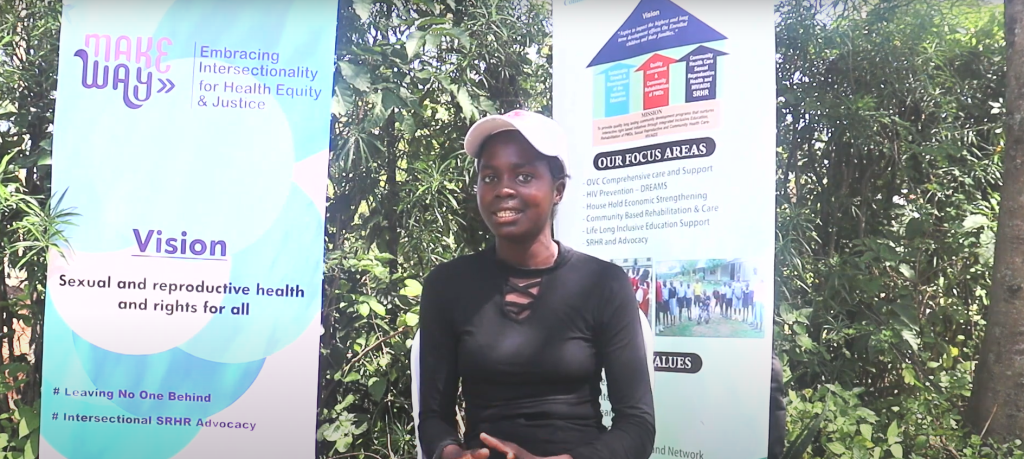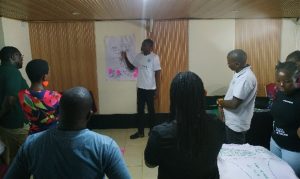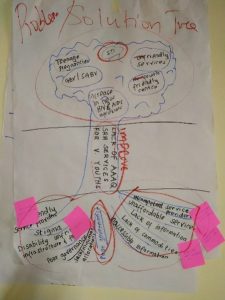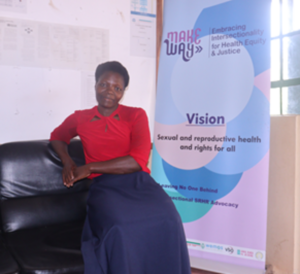Investing in women’s health: Accelerating progress through adequate health financing
 08 March 2024
08 March 2024

International Women’s Day 2024 marks not just a celebration of women’s achievement of women’s health and right issues but also a crucial moment to address the ongoing challenges they face, particularly in accessing sexual and reproductive health and rights (SRHR) services and commodities. As we delve into the theme “Invest in Women: Accelerate Progress,” the Make Way Alliance in Kenya, in collaboration with MeTA Kenya, embarks on a journey to spotlight the critical intersection of health financing and sexual and reproductive health and rights (SRHR), particularly through the lens of youth empowerment and advocacy.
 Last year, the Make Way programme conducted a budget advocacy training to 15 youths from Seme Sub-county. The training aimed to equip the youths with knowledge on the analysis of the proposed Kisumu County budget estimates FY 2023/24 and make submissions on the budget document to the County Assembly. Following the training, the young advocates have emerged as champions for change, equipped with the knowledge and skills to navigate complex budget processes and advocate for increased allocations within the health sector. Their engagement in public participation forums and round table discussions with their Members of County Assembly has well positioned them to amplify the voices of marginalised communities and shaping health financing policies to better meet the needs of women and girls.
Last year, the Make Way programme conducted a budget advocacy training to 15 youths from Seme Sub-county. The training aimed to equip the youths with knowledge on the analysis of the proposed Kisumu County budget estimates FY 2023/24 and make submissions on the budget document to the County Assembly. Following the training, the young advocates have emerged as champions for change, equipped with the knowledge and skills to navigate complex budget processes and advocate for increased allocations within the health sector. Their engagement in public participation forums and round table discussions with their Members of County Assembly has well positioned them to amplify the voices of marginalised communities and shaping health financing policies to better meet the needs of women and girls.
Through interviews with various stakeholders as part of this campaign, critical challenges have come to light providing invaluable insights into the realities faced by individuals navigating the healthcare landscape. Here are some key highlights:
1. Most of the interviewees lamented the absence of dedicated youth-friendly health centers, highlighting the need for safe and accessible spaces tailored to the unique needs of young people.
“Within Seme sub-county, there are no youth friendly centres which exacerbates the barriers to young people accessing comprehensive SRHR services.”
Sylvester Otieno, Youth Champion
2. Privacy within healthcare facilities emerged as a significant concern, particularly for young people seeking SRHR services. The lack of confidentiality and privacy impedes individuals’ willingness to access essential healthcare services.
“Some of the challenges that we face as youth is the lack of privacy at the facilities, unfriendly service providers and long waiting hours at the facilities before accessing a service.”
Perez Atieno, Youth champion
3. Persons with disabilities face multiple barriers, including the absence of sign language interpreters and limited access to information due to literacy challenges. This lack of inclusivity undermines their ability to fully engage with and benefit from available healthcare services.
“As a person with disability, the barrier is mostly on accessibility, affordability and availability. When I go to a health facility, it can be challenging to get information because there are no sign language interpreters or braille information versions. Therefore, I may not be able to be fully aware of the services available at the facilities for my access.”
Kennedy Gumba, Youth Champion
4. Financial constraints pose a major barrier to accessing healthcare services, especially for young people and marginalised communities. The high cost of services and commodities within healthcare facilities exacerbates existing inequalities, disproportionately affecting vulnerable populations.
 Amidst these challenges, the role of youth in shaping health financing policies emerges as a catalyst for change. Empowered with the knowledge gained through budget advocacy training, young advocates play a pivotal role in advocating for gender-responsive budgets that prioritise SRHR services and commodities, ensuring equitable access for women and girls. Their voices, amplified through public participation and engagement with policymakers, serve as a driving force behind policy reforms aimed at addressing the diverse needs of marginalised communities.
Amidst these challenges, the role of youth in shaping health financing policies emerges as a catalyst for change. Empowered with the knowledge gained through budget advocacy training, young advocates play a pivotal role in advocating for gender-responsive budgets that prioritise SRHR services and commodities, ensuring equitable access for women and girls. Their voices, amplified through public participation and engagement with policymakers, serve as a driving force behind policy reforms aimed at addressing the diverse needs of marginalised communities.
Furthermore, to enhance knowledge and participation in budget decision-making spaces on SRHR, concerted efforts are needed to provide targeted capacity-building initiatives and mentorship opportunities for young advocates. Empowering youth with the necessary skills and resources not only strengthens their advocacy efforts but also fosters a more inclusive and participatory decision-making process.
Some of the proposed solutions recommended by the youth champions with regards to addressing some of the challenges they were facing in accessing sexual and reproductive health services and commodities include:
- Bringing service providers to a round table to discuss the challenges facing the youth and drawing up a joint action plan on how the challenges will be addressed.
- Investing in dedicated youth-friendly health centers equipped with trained staff and confidential services to meet the unique needs of young people.
- Ensuring accessibility for persons with disabilities through the provision of sign language interpreters, Braille materials, and other accommodations to promote inclusivity within healthcare settings.
- Implementing measures including provision of free services, particularly for family planning to enhance the affordability of healthcare services for vulnerable populations.
- Increasing budgetary allocations for SRHR.
- Increase capacity building initiatives among young people to enable them cascade down the knowledge to their peers and maximize their meaningful participation and engagement in budget and decision-making processes.
As we commemorate International Women’s Day 2024, let us heed the voices of those on the frontline of advocates and commit to meaningful investing in women’s health and rights. By addressing the challenges highlighted by young people and championing robust health financing mechanisms, we can accelerate progress towards achieving comprehensive SRHR for all, leaving no woman or young person behind.

Pauline Akinyi, youth champion, Seme sub-county



